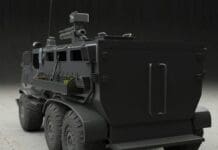This post is also available in:
 עברית (Hebrew)
עברית (Hebrew)
Jump Aero has unveiled its JA1 “Pulse” all-electric vertical takeoff and landing (eVTOL) aircraft that will revolutionize emergency medical services.
The JA1 “Pulse” is aimed to significantly reduce emergency response times in rural areas and ensure that crucial medical assistance reaches those in need within the critical 8-minute emergency response window. The aircraft’s dash speed is 250 knots, which makes it the fastest form of sustainable personal transportation, promising to extend the reach of life-saving services.
Falck Ambulance Services, who’s renowned for its unwavering commitment to providing emergency response and healthcare services in 26 countries across the board, recognized the potential of the JA1 “Pulse” and placed the first commercial order for the eVTOL from Jump Aero.
Flack CEO Jakob Riis said he is excited for the collaboration- “Falck is excited to partner with Jump Aero to help us revolutionize the future of emergency services. By enabling professional help to reach hard-to-access locations in a timely manner, Jump Aero will help Falck to deliver improved services to our customers.”
According to Interesting Engineering, the US Air Force has decided to back Jump Aero’s mission to transform emergency response, securing $3.6 million in contracts to expedite the development of this tech and test an “electronic parachute” to support safe eVTOL aircraft operations.
Lt Col John Tekell, Agility Prime Program Lead has stated that they “look forward to working with Jump Aero to help mature their dual-use technology.”
The JA1 “Pulse” is reportedly designed to transport a single trained professional with essential emergency equipment to landing zones in rural areas, thus significantly improving the reach and effectiveness of emergency services.
When emergencies arise, every single second counts towards saving human lives. This innovative eVTOL promises to bridge the gap between critical care and remote locations, and be the lifeline that countless families and individuals in rural areas desperately need.


























